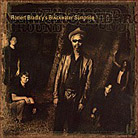April 2002
That kind of experience and hardship gives Bradley’s singing a feeling of authority and power that can’t be faked. On a song like "See Her," the standout track on New Ground, Bradley sings with such effortless conviction that he should be able to drive from your memory forever the strained attempts at soul that so many singers try to pass off today. His performances on that song and on "Exist for Love" are almost textbook examples of how much fire an honest, emotional singer can bring to a song. Bradley is such a truthful singer that it’s a shame New Ground almost overwhelms him. Part of the problem is that the band is too eclectic for its own good. There are a number of very good songs on the disc, but it’s difficult to pin down what the band wants to accomplish. They want to be a rock band, then a soul band, then a funk band (the one genre they don’t pull off). And at least one song here is just puzzling. I’m not sure any singer should have "Profile" foisted on him, but I’m certain that an alternative power-rock song is the one thing Robert Bradley can’t sing and shouldn’t have to. The bigger problem is the production. Jay Joyce, who engineered and produced the disc, appears to have never heard a studio effect that he didn’t like. He’s imposed nearly all of them on New Ground. The most irritating is a delay that trails Bradley’s voice. Sometimes Joyce restrains himself enough to merely add a touch of reverb, but more often he attaches a distracting echo to Bradley. The disc has also been compressed to the point that everything is pushed up front. In "See Her," the background vocals are so far forward that Bradley seems to be fighting his way through them. There are also some aesthetic choices that are maddeningly inappropriate. Honestly, would it have killed someone to use a real piano in "Exist for Love"? There’s a squishy sound in the drum track for "Feel the Fire" that can only have been placed there to vex the listener -- no logical or musical purpose presents itself. The natural subtlety and sincerity that Bradley brings to his performances is thwarted at almost every turn. The band is also ill-served by these high-jinks. It took me several listens to realize that the musicians in Blackwater Surprise are impassioned and, at times, inspired players, particularly drummer Jeff Fowlkes and guitarist Matt Ruffino. Ruffino’s often beautiful solos are drenched in so much compression and delay that they seem to land in your lap when they should glide over the song. Giles Reaves is credited with "additional editing" and some keyboards. If I’m not mistaken, Reeves recorded some ambient discs for MCA a few years back. Pleasant enough, if you like that kind of thing, but the "sonic landscape" approach is completely wrong for the kind of music Robert Bradley and his band play. Perhaps I’m being too hard on New Ground. The songwriting is so strong and the performances so heartfelt that I did find myself returning to the disc, hoping to be able to separate the dishonesty of the recording methods from the integrity of the band’s approach to the music. I found that, in time, I was nearly able to separate the production from the songs. But I still can’t help feeling that the opportunity to present this band in the manner they deserve was missed here. Here’s a suggestion to the producers and, to a much lesser extent, the band: Pick up a copy of The Complete Stax/Volt Singles 1959-1968. Put all nine discs in the changer and listen to nothing else for about a week. About halfway through disc one you’ll figure it out. GO BACK TO: |
 Robert Bradley's Blackwater Surprise - New Ground
Robert Bradley's Blackwater Surprise - New Ground![[Reviewed on CD]](../format/regcd.gif) The
best thing about Robert Bradley’s Blackwater Surprise is Robert Bradley himself. His
voice mixes two strains of Southern music, blues and country, in a manner similar to that
of soul greats Percy Sledge and Arthur Alexander. The story of his discovery by two
Detroit musicians who heard his street singing through an open window in their recording
studio is the stuff of legends. Bradley had spent the previous 18 years traveling from
city to city, earning his living singing and playing guitar on street corners and in
parks.
The
best thing about Robert Bradley’s Blackwater Surprise is Robert Bradley himself. His
voice mixes two strains of Southern music, blues and country, in a manner similar to that
of soul greats Percy Sledge and Arthur Alexander. The story of his discovery by two
Detroit musicians who heard his street singing through an open window in their recording
studio is the stuff of legends. Bradley had spent the previous 18 years traveling from
city to city, earning his living singing and playing guitar on street corners and in
parks.